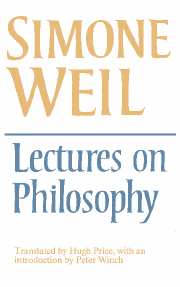3 - Politics and social theory
Published online by Cambridge University Press: 09 December 2009
Summary
‘Not to laugh at what human beings do, nor to be disgusted by it, but to understand it.’
(Spinoza)Sociology: how one is to think of it
Sociology is the last of the sciences in point of time. One might say that it doesn't yet exist. Generally, people always deal with social questions in such a way as to arouse passions. A scientific study of society should enable us to see what kind of society it is that would be the least oppressive in the given conditions. If one could understand on what oppression depends, one would no longer be in that unbearable situation of having to submit to it by being forced in to a state of complete disorder. The idea of inequality between the oppressors and the oppressed would disappear. The oppressors would no longer think of themselves as the instruments of God; they would think of themselves as the tools of necessity. The oppressed, for their part, would no longer think of the oppressors as a race set apart.
Society does not depend on reason and virtue for ‘religion holds sway when a man is at the point of death, when diseases have overcome the passions, and man lies lifeless, or else in temples where men have nothing to do with one another; but it has no power in the market place or at court, where its power is needed most of all’.
- Type
- Chapter
- Information
- Lectures on Philosophy , pp. 129 - 164Publisher: Cambridge University PressPrint publication year: 1978



